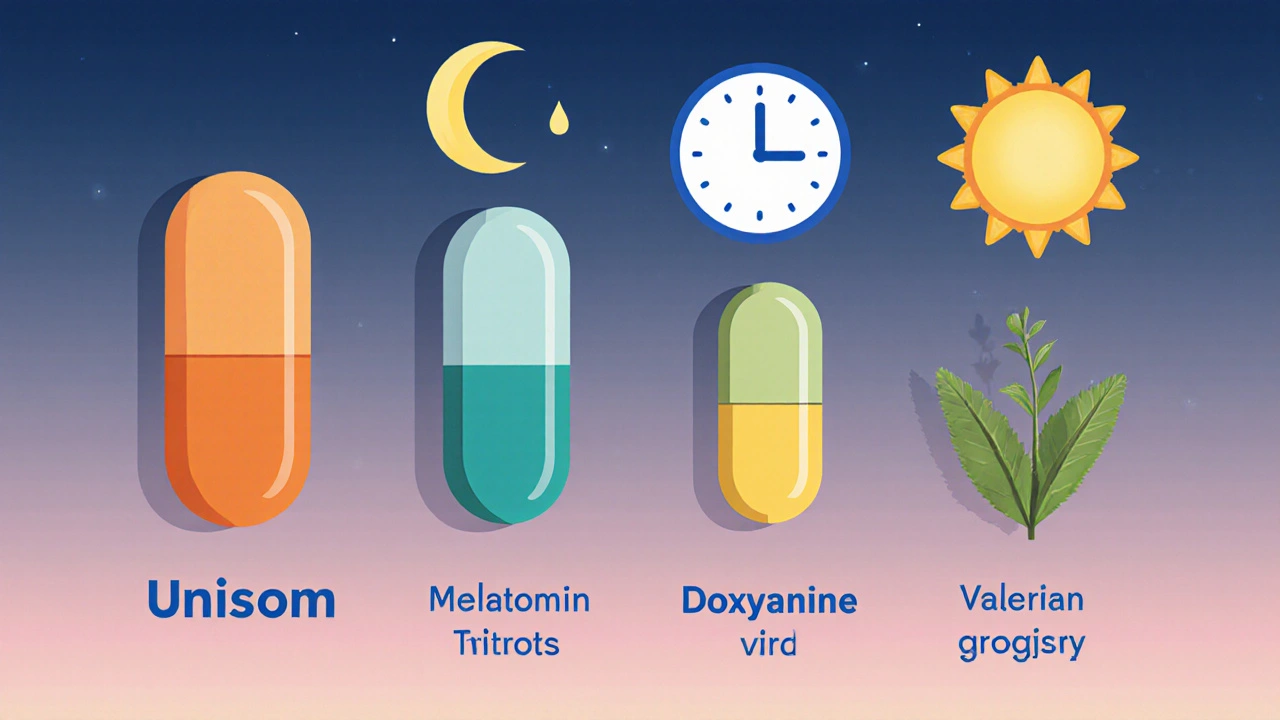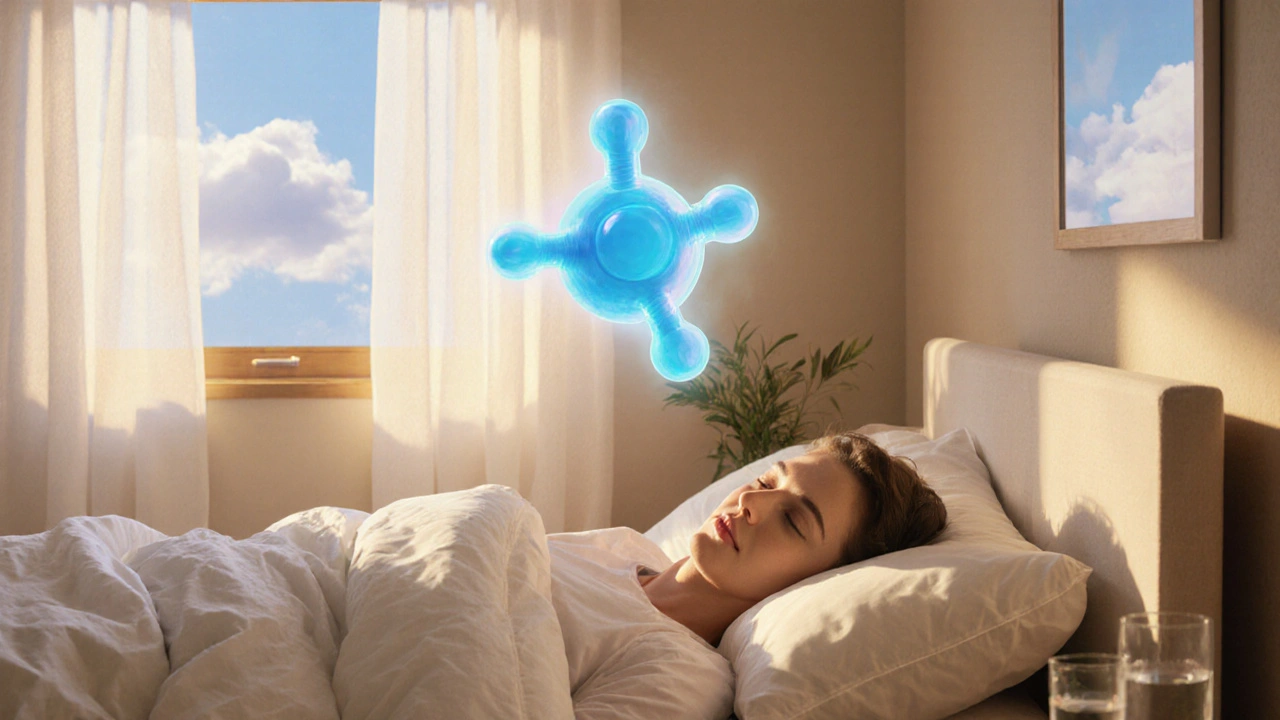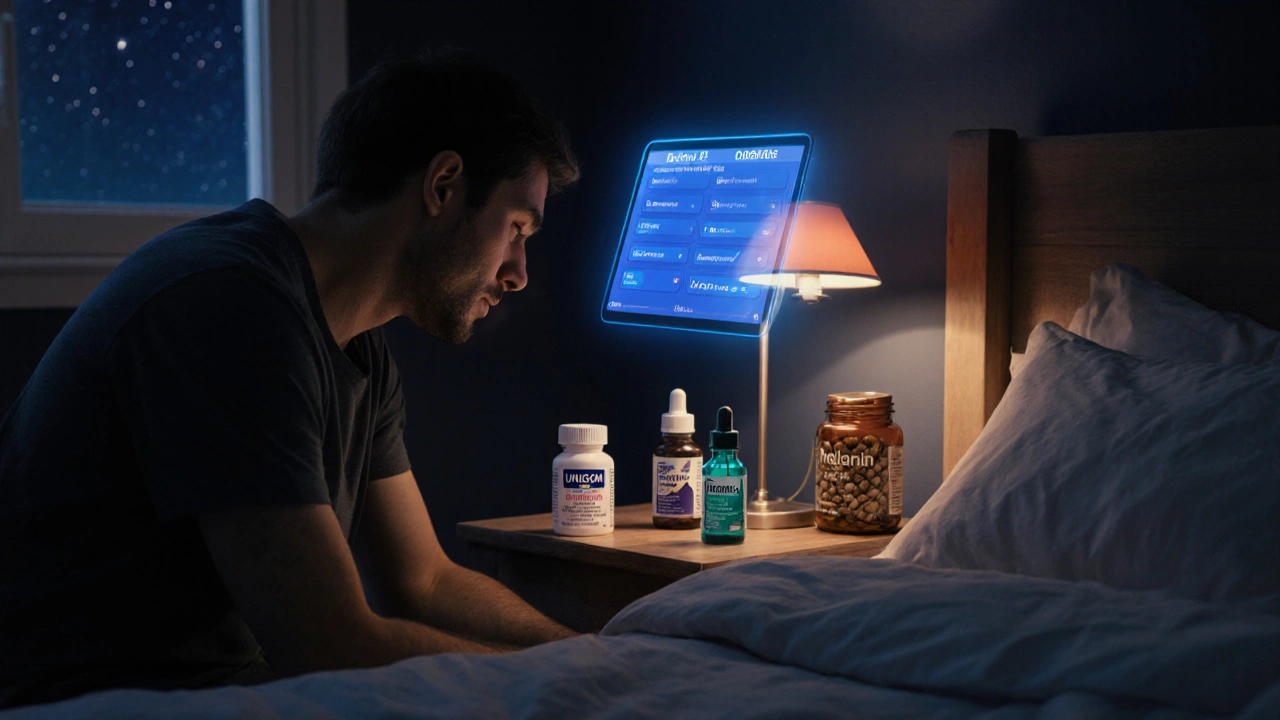Sleep Aid Selector
Recommended Sleep Aid
Why This Choice?
When a restless night hits, the first thing many of us reach for is an over‑the‑counter sleep aid. Unisom is a brand name for diphenhydramine, an antihistamine that doubles as a nighttime helper. It’s cheap, easy to find, and promises you’ll be out like a light. But is it really the best option for you? Below we break down how Unisom stacks up against other popular choices, from hormone‑based supplements to herbal extracts, so you can pick the one that matches your lifestyle, health needs, and tolerance level.
Key Takeaways
- Unisom works by blocking histamine receptors, which can cause next‑day drowsiness for many users.
- Melatonin mimics your body’s natural sleep hormone and is gentle on morning alertness.
- Doxylamine is another antihistamine that often feels stronger than Unisom but carries similar hangover risks.
- Herbal options like valerian root have mixed evidence and may work best for mild insomnia.
- Safety, drug interactions, and personal health conditions should guide your final pick.
What Is Unisom?
Unisom is sold in 25mg and 50mg tablets (the 50mg version is often marketed as “Unisom SleepTabs”). Its active ingredient, diphenhydramine, is also the main component of many allergy medicines.
The drug was first approved by the FDA in the 1940s as an antihistamine. Over time, manufacturers discovered that its sedating side‑effect could be a useful cue for bedtime, turning it into a de‑facto sleep aid.
How Unisom Works
Diphenhydramine blocks H1 histamine receptors in the brain. Histamine is a neurotransmitter that keeps you awake, so when the signal is dampened, you feel drowsy. The effect starts within 30minutes and peaks around 2hours after ingestion.
Because it crosses the blood‑brain barrier, it also interferes with acetylcholine. That’s why users often report a “foggy” feeling the next morning, especially after the 50mg dose.

Common Alternatives
Below are the most widely used over‑the‑counter sleep aids you’ll see on pharmacy shelves.
- Melatonin - a hormone your body produces at night. Supplements range from 0.5mg to 10mg.
- Doxylamine - marketed under brands like Unisom SleepAid (the 25mg formula) and sometimes sold as “Nighttime Pain Relief.”
- Benadryl - another diphenhydramine product, primarily advertised for allergies but commonly used off‑label for sleep.
- ZzzQuil - a flavored diphenhydramine formulation aimed at adults who don’t want a “medicine” taste.
- Valerian root - a herbal extract with centuries‑old use in Europe; typically sold in 300‑500mg capsules.
- OTC combination products (e.g., NyQuil) that pair diphenhydramine with a cough suppressant - not ideal unless you have cold symptoms.
Side‑By‑Side Comparison
| Feature | Unisom (diphenhydramine) | Melatonin | Doxylamine | Valerian Root |
|---|---|---|---|---|
| Typical Dose | 25mg or 50mg tablet | 0.5mg - 10mg | 25mg tablet | 300mg - 500mg capsule |
| Onset Time | 30-60min | 30-120min (varies with formulation) | 45-90min | 60-120min |
| Duration of Sleep | 6-8hrs (may cause next‑day sedation) | 4-6hrs (usually no hangover) | 6-9hrs (higher hangover risk) | 3-5hrs (mild effect) |
| Morning Grogginess | Common, especially >25mg | Rare | Common | Occasional |
| Regulatory Status | OTC FDA‑approved as an antihistamine | OTC dietary supplement (not FDA‑regulated as a drug) | OTC FDA‑approved antihistamine | Dietary supplement (varies by brand) |
| Best For | Occasional insomnia, especially when allergies are present | Shift‑work, jet lag, mild difficulty falling asleep | Heavy‑weight sleepers who need longer sedation | People preferring natural/herbal routes |
Choosing the Right Sleep Aid
Not every sleep aid fits every person. Here’s a quick decision guide you can run through before you head to the pharmacy.
- Do you have any chronic health issues? If you have asthma, glaucoma, or an enlarged prostate, antihistamines like Unisom can worsen symptoms. Melatonin or valerian may be safer.
- Will you need to be alert the next morning? For early‑morning commitments, melatonin’s low hangover profile beats diphenhydramine‑based products.
- Are you taking prescription meds? Diphenhydramine can interact with sedatives, antidepressants, and blood thinners. Always check with a pharmacist.
- Do you prefer a “natural” label? Valerian and other botanicals appeal to those avoiding synthetic chemicals, but clinical evidence is less robust.
- How much do you want to spend? Unisom and generic diphenhydramine cost pennies per tablet. Melatonin and herbal extracts can be pricier, especially in higher‑dose formulations.
After you answer these questions, you’ll have a clearer picture of whether Unisom, melatonin, doxylamine, or a herbal option is the best fit.
Potential Side Effects & Safety Tips
Every sleep aid carries some risk. Below are the most common concerns for each class.
- Unisom (diphenhydramine): Dry mouth, blurred vision, constipation, urinary retention, and next‑day drowsiness. Older adults should use with caution because falls are more likely.
- Melatonin: Rarely causes vivid dreams or mild morning grogginess at high doses. Over‑supplementation may disrupt natural hormone cycles.
- Doxylamine: Similar to diphenhydramine but often felt as stronger sedation. Can worsen depression or anxiety in sensitive individuals.
- Valerian Root: Possible headache, dizziness, or stomach upset. Some users report a “hangover” feeling if taken in large amounts.
General safety rules: start with the lowest effective dose, avoid alcohol, and never combine multiple antihistamines. If you need a sleep aid for more than two weeks, it’s time to see a doctor.

Frequently Asked Questions
Can I take Unisom every night?
Occasional use is fine, but daily reliance can lead to tolerance and increased next‑day drowsiness. If insomnia persists, talk to a healthcare professional.
Is melatonin safer than Unisom?
For most healthy adults, melatonin poses fewer morning‑grogginess risks because it works with the body’s natural sleep hormone rather than blocking brain chemistry.
What’s the difference between Unisom and ZzzQuil?
Both contain diphenhydramine; ZzzQuil is flavored and marketed as a “sleep liquid” while Unisom is a standard tablet. The active dose is usually the same.
Can I combine melatonin with Unisom?
Combining them can amplify sedation and increase the chance of grogginess. It’s best to try one at a time to see which works for you.
Are there any long‑term risks with diphenhydramine?
Long‑term, high‑dose use has been linked to cognitive decline in older adults. That’s another reason to keep use occasional and low‑dose.
Choosing the right sleep aid comes down to how your body reacts, what other health factors are in play, and how you value cost versus convenience. Armed with the comparison above, you can make a decision that helps you get the rest you need without unwanted side effects.


15 Comments
Boston Farm to School
I’ve tried Unisom a few times; it knocks me out fast 😊 but the morning fog can be a hassle. It’s cheap, so it’s still in my night‑time stash.
Emily Collier
For anyone weighing the pros and cons, diphenhydramine offers a reliable sedative effect but it also antagonizes acetylcholine, which explains the classic “hangover” feeling. Melatonin, by contrast, works with the body’s endogenous sleep‑wake cycle and rarely leaves you groggy. If you have a chronic condition such as glaucoma or an enlarged prostate, it’s safer to avoid antihistamines and opt for a hormone‑based supplement. Cost‑wise, Unisom is hard to beat, yet the price difference with melatonin has narrowed thanks to generic options. Ultimately, matching the aid to your health profile and morning schedule will yield the best rest.
Catherine Zeigler
When choosing a sleep aid, it helps to start with the biology of sleep rather than just the marketing label. The brain’s natural melatonin surge signals that it’s time to wind down, and supplementing that hormone can smooth the transition without blunting neurotransmitters. Diphenhydramine, the active ingredient in Unisom, is an H1‑histamine blocker that forces drowsiness by silencing a wake‑promoting pathway. That mechanism is effective, yet it also interferes with acetylcholine, which is why many users describe a “brain fog” the next morning. In younger adults the fog may be tolerable, but older individuals are at higher risk for falls and cognitive slowing. Melatonin, on the other hand, is metabolized quickly and does not accumulate, so the risk of next‑day sedation is minimal. Doxylamine works similarly to diphenhydramine but tends to produce a deeper, longer‑lasting sleep, which can be a double‑edged sword for those who need to be alert. Valerian root contains compounds that modulate GABA receptors, offering a gentle calming effect, though clinical evidence remains mixed. Cost is another practical factor: a bottle of generic Unisom can cost a few dollars, while high‑dose melatonin or premium valerian extracts can run significantly higher. Drug interactions also tip the balance; antihistamines combine poorly with other sedatives, antidepressants, or anticholinergic medications. If you are already taking prescription drugs, melatonin’s low interaction profile often makes it the safer choice. For people with respiratory issues such as asthma, antihistamines may trigger bronchoconstriction, so a non‑antihistamine alternative is advisable. Likewise, patients with glaucoma should avoid diphenhydramine because it can increase intra‑ocular pressure. Personal tolerance plays a role, too-some find the taste of ZzzQuil unpleasant, whereas tablets of melatonin are virtually flavorless. Habitual use of any over‑the‑counter sleep aid should be limited to a few weeks, after which a clinician can assess underlying insomnia causes. In summary, match the aid to your health status, morning obligations, and budget to achieve the most restorative rest possible.
henry leathem
While the prose is exhaustive, the practical takeaway is simple: antihistamines are a blunt instrument that pedals you into a chemically‑induced coma, and the “gentle” label is a marketing smokescreen. If you’re not prepared to trade cognitive clarity for a few extra hours of REM, you’re better off skipping the H1 blockade entirely.
jeff lamore
I appreciate the thorough overview; it’s useful to see the trade‑offs laid out in plain terms. I would add that consulting a pharmacist can further clarify potential interactions, especially for patients on polypharmacy regimens.
Kris cree9
This whole debate is just a marketing ploy!
Paula Hines
One must consider the ethical implications of sedating agents; the commodification of sleep reduces a physiological necessity to a profit‑driven transaction.
John Babko
Indeed, the cost factor is decisive-nothing beats a $3 bottle of Unisom, especially when national healthcare budgets demand affordable solutions for the masses!
Stacy McAlpine
For folks who value simplicity, melatonin offers a clean solution without the anticholinergic baggage that comes with diphenhydramine.
Roger Perez
Great summary! 🌙👍 It’s good to remember that lifestyle tweaks-like dimming lights and avoiding screens-can boost any of these aids.
michael santoso
The synthesis of the comparative matrix is commendable, yet it neglects the sociocultural determinants of sleep hygiene, which arguably outweigh pharmacologic considerations.
M2lifestyle Prem nagar
Start low, adjust as needed.
Karen Ballard
Thanks for the info! 😊💤
Gina Lola
Honestly, I just pop whatever’s on the nightstand and hope for the best; the science feels overblown sometimes.
Hanna Sundqvist
They don’t want you to know that Big Pharma strings together these “sleep aids” to keep us dependent on their endless product lines.